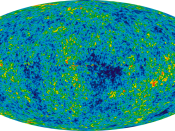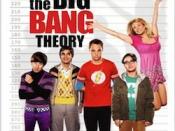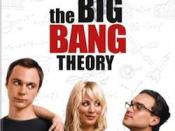This is a power point on the big bang.
The Big Bang
Lauren Kohles
Physics 5
February 24, 2005
Definition
An astronomy theory that says the Universe began with a super-powerful explosion. Georges-Henri Lemaitre is called by some, the father of the Big Bang Theory.
The Big Bang is only a theory, it has not been proven true.
Start of the Big Bang
The big bang occurred about 14 billion years ago.
Astronomers believe that the entire Universe was inside a bubble that was thousands of times smaller than a pinhead, and that it was hotter and denser than anything imaginable.
It is believed that it suddenly exploded.
Big Bang Simulation
http://www.astro.ubc.ca/~scharein/a311/Sim.html
The Universe
The Universe is still expanding today and it is believed that in the future, the Universe will stop expanding and deflate to the origin of the big bang.
Start of the Big Bang
In less than a second, the Universe grew from the size of an atom to the size of a galaxy.
It is estimated that the temperature of the entire universe was 1000 trillion degrees Celsius a fraction of a second.
How Big is the Big Bang?
Formation of the Universe
As the Universe expanded and cooled, energy changed into particles of matter and antimatter which destroyed each other
Over the next three minutes, the temperature dropped below 1 billion degrees Celsius.
Protons and neutrons survived and started to form when the Universe was one second old.
Formation of the Universe cont
It was now cool enough for the protons and neutrons to come together, forming hydrogen and helium nuclei.
After 300 000 years, the Universe had cooled to about 3000 degrees, and atomic nuclei could capture electrons to form atoms.
The Universe filled with clouds of hydrogen and helium gas.
Interesting Fact
Did you know that the static on your television is caused by radiation left over from the Big Bang?
Cosmology
A branch of science which studies the evolution of our Universe.
Cosmologists try to discover what the Universe was like billions of years ago and also what the Universe will be like billions of years in the future.
Bibliography
http://science.nasa.gov/headlines/y2003/images/map/dawnoftime1.jpg
http://www.univie.ac.at/strv-astronomie/unterhaltung/size-of-big-bang.gif
http://www.creationevidence.org/cemframes.html?http%3A//www.creationevidence.org/fun_for_kids/fun_for_kids.html


